[abc周赛复盘] AtCoder Beginner Contest 308 20230701
总结
- T1 模拟
- T2 单源最短路dijikstra
- T3 多源最短路floyd

A - New Scheme
链接: A - New Scheme
1. 题目描述
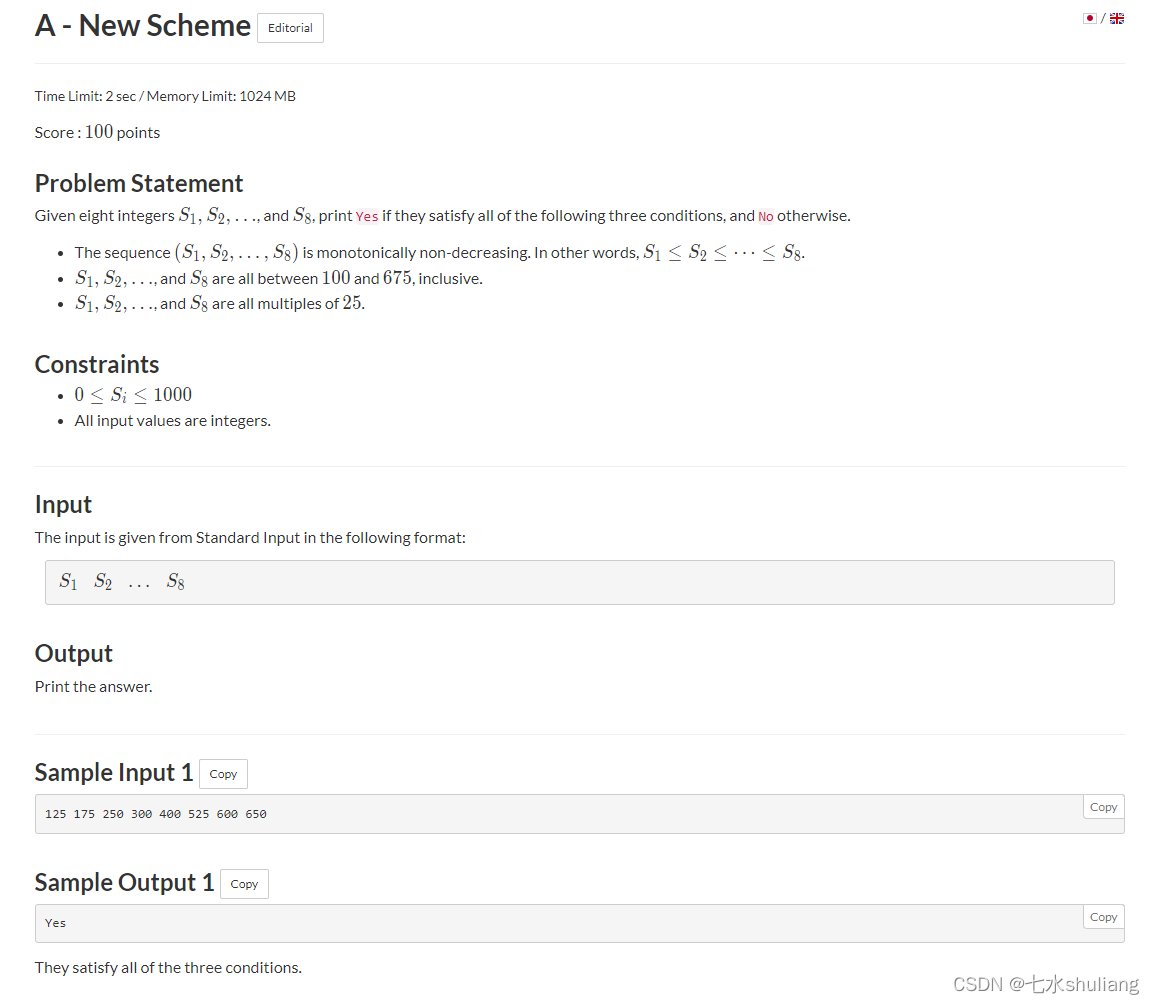
2. 思路分析
- 模拟。
3. 代码实现
# Problem: A - New Scheme
# Contest: AtCoder - AtCoder Beginner Contest 308
# URL: https://atcoder.jp/contests/abc308/tasks/abc308_a
# Memory Limit: 1024 MB
# Time Limit: 2000 ms
import sys
import random
from types import GeneratorType
import bisect
import io, os
from bisect import *
from collections import *
from contextlib import redirect_stdout
from itertools import *
from array import *
from functools import lru_cache, reduce
from heapq import *
from math import sqrt, gcd, inf
if sys.version >= '3.8': # ACW没有comb
from math import comb
RI = lambda: map(int, sys.stdin.buffer.readline().split())
RS = lambda: map(bytes.decode, sys.stdin.buffer.readline().strip().split())
RILST = lambda: list(RI())
DEBUG = lambda *x: sys.stderr.write(f'{str(x)}\n')
# print = lambda d: sys.stdout.write(str(d) + "\n") # 打开可以快写,但是无法使用print(*ans,sep=' ')这种语法,需要print(' '.join(map(str, p))),确实会快。
DIRS = [(0, 1), (1, 0), (0, -1), (-1, 0)] # 右下左上
DIRS8 = [(0, 1), (1, 1), (1, 0), (1, -1), (0, -1), (-1, -1), (-1, 0),
(-1, 1)] # →↘↓↙←↖↑↗
RANDOM = random.randrange(2 ** 62)
MOD = 10 ** 9 + 7
# MOD = 998244353
PROBLEM = """给8个数字,检测是否同时满足下边3个性质
1. 数列单调不降
2. 每个数都在100~675之间
3. 每个数都是25的倍数
"""
def lower_bound(lo: int, hi: int, key):
"""由于3.10才能用key参数,因此自己实现一个。
:param lo: 二分的左边界(闭区间)
:param hi: 二分的右边界(闭区间)
:param key: key(mid)判断当前枚举的mid是否应该划分到右半部分。
:return: 右半部分第一个位置。若不存在True则返回hi+1。
虽然实现是开区间写法,但为了思考简单,接口以[左闭,右闭]方式放出。
"""
lo -= 1 # 开区间(lo,hi)
hi += 1
while lo + 1 < hi: # 区间不为空
mid = (lo + hi) >> 1 # py不担心溢出,实测py自己不会优化除2,手动写右移
if key(mid): # is_right则右边界向里移动,目标区间剩余(lo,mid)
hi = mid
else: # is_left则左边界向里移动,剩余(mid,hi)
lo = mid
return hi
def bootstrap(f, stack=[]):
def wrappedfunc(*args, **kwargs):
if stack:
return f(*args, **kwargs)
else:
to = f(*args, **kwargs)
while True:
if type(to) is GeneratorType:
stack.append(to)
to = next(to)
else:
stack.pop()
if not stack:
break
to = stack[-1].send(to)
return to
return wrappedfunc
# ms
def solve():
a = RILST()
for i in range(1, 8):
if a[i - 1] > a[i]:
return print('No')
for i, v in enumerate(a):
if v % 25:
return print('No')
if not 100 <= v <= 675:
return print('No')
print('Yes')
if __name__ == '__main__':
t = 0
if t:
t, = RI()
for _ in range(t):
solve()
else:
solve()
B - Default Price
1. 题目描述
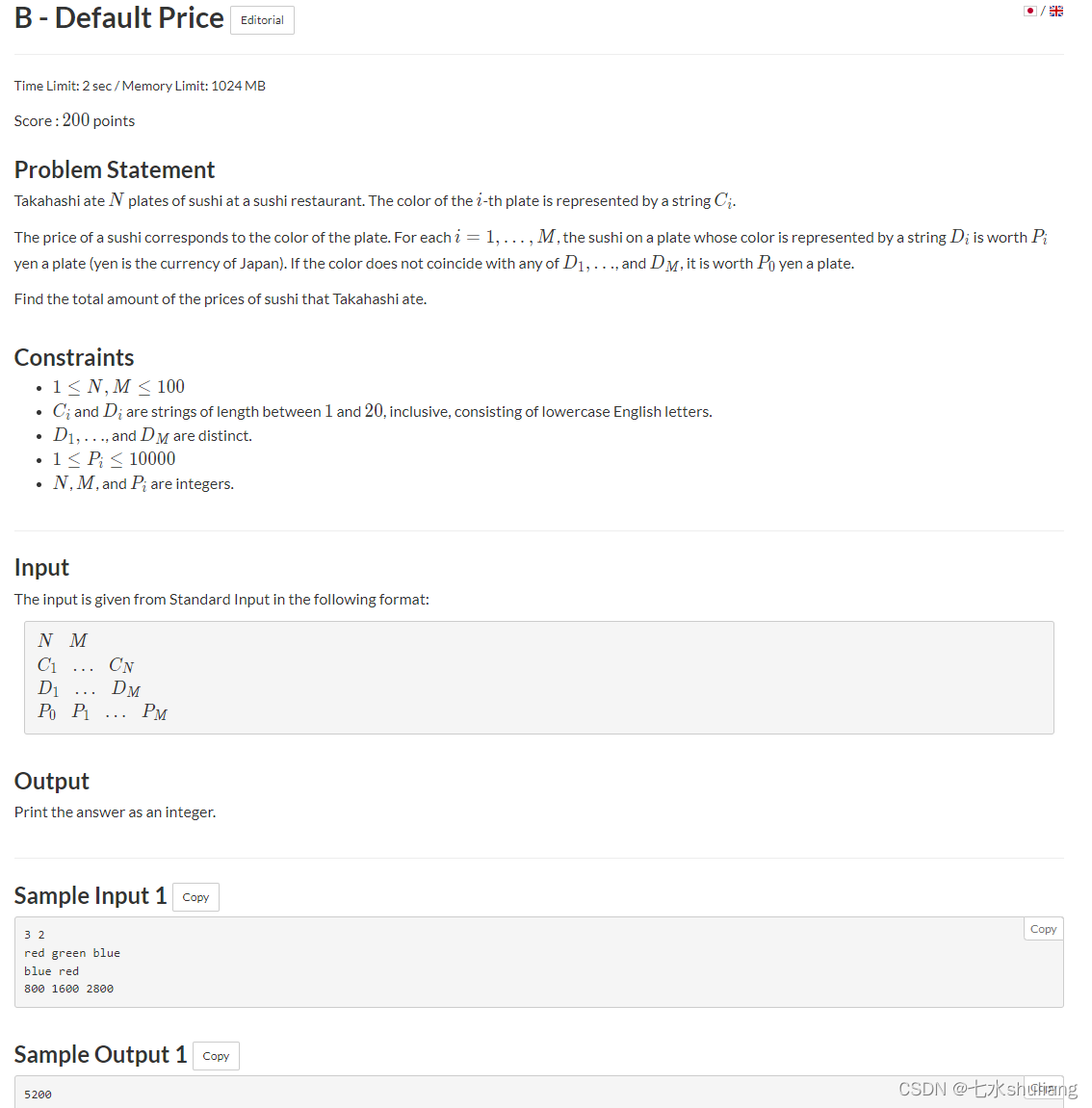
2. 思路分析
3. 代码实现
PROBLEM = """给n盘寿司,和每盘寿司的颜色。
给出m种颜色对应的价格,若吃的寿司没有给出,则价格是p[0].
问一共花了多少钱。
"""
"""哈希表模拟"""
# ms
def solve():
n, m = RI()
cs = list(RS())
ds = list(RS())
p0, *ps = RI()
dd = {d: p for d, p in zip(ds, ps)}
print(sum(dd.get(c, p0) for c in cs))
C - Standings
链接: C - Standings
1. 题目描述
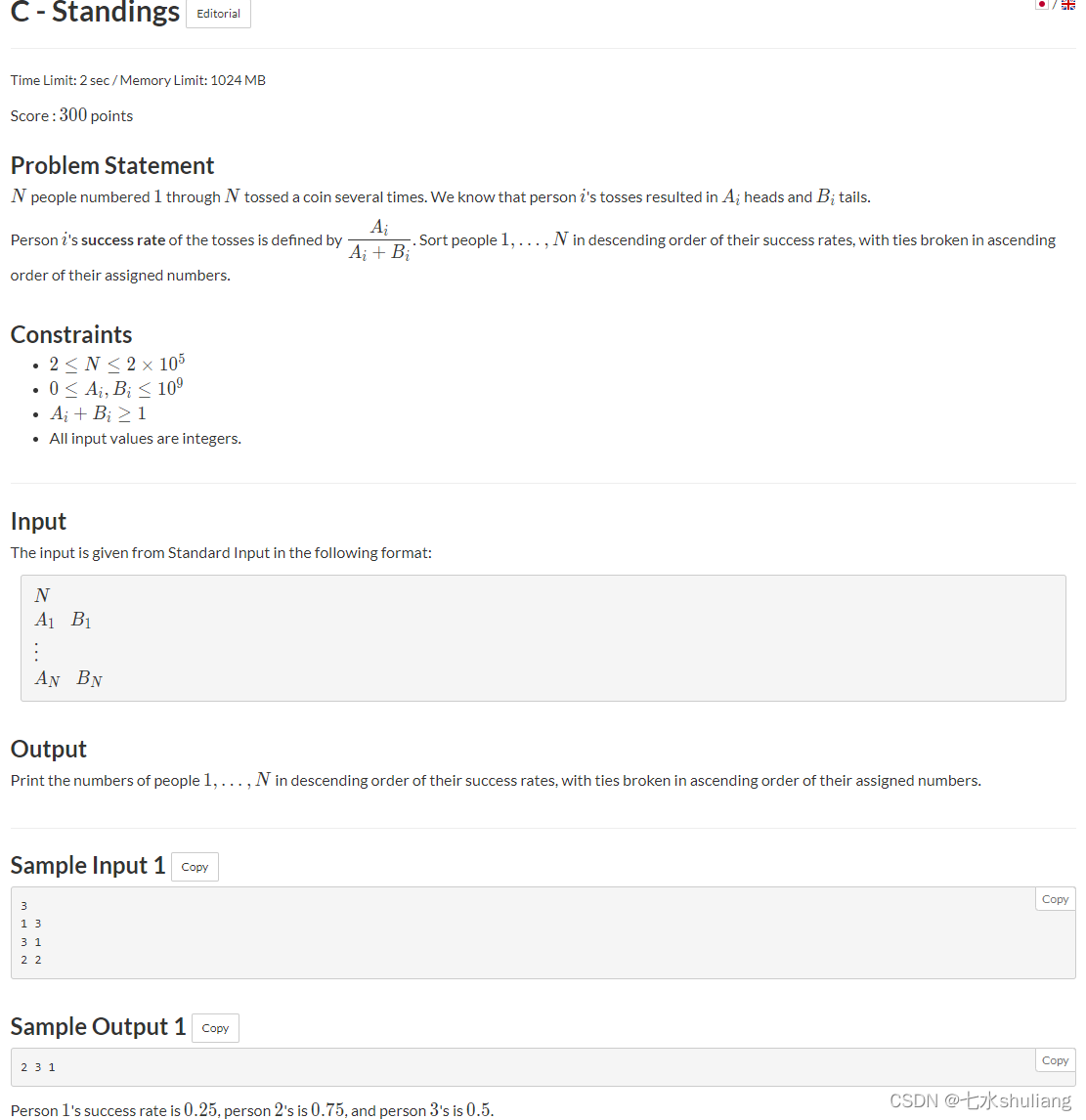
2. 思路分析
- 这题主要是用key=lambda自定义key方式会wa4组,卡精度了。必须转化成乘法防止丢精度。
3. 代码实现
PROBLEM = """给出每个人投硬币正面和反面的次数,定义命中率为a/(a+b),
要求按命中率降序,若相同,则按序号升序。
"""
"""其实就是自定义排序,但py的自定义key写法涉及到浮点数,这题会卡。
因此要自定义比较器:`key=cmp_to_key(comp)`.
实现时return 小值-大值。
具体参考代码
"""
# ms
def solve():
n, = RI()
a = []
for i in range(1, n + 1):
x, y = RI()
a.append((x, y, i))
def comp(t1, t2):
if t1[0] * (t2[0] + t2[1]) == t2[0] * (t1[0] + t1[1]):
return t1[2] - t2[2]
return -t1[0] * (t2[0] + t2[1]) + t2[0] * (t1[0] + t1[1])
a.sort(key=cmp_to_key(comp))
print(*[y for _, _, y in a])
D - Snuke Maze
链接: D - Snuke Maze
1. 题目描述
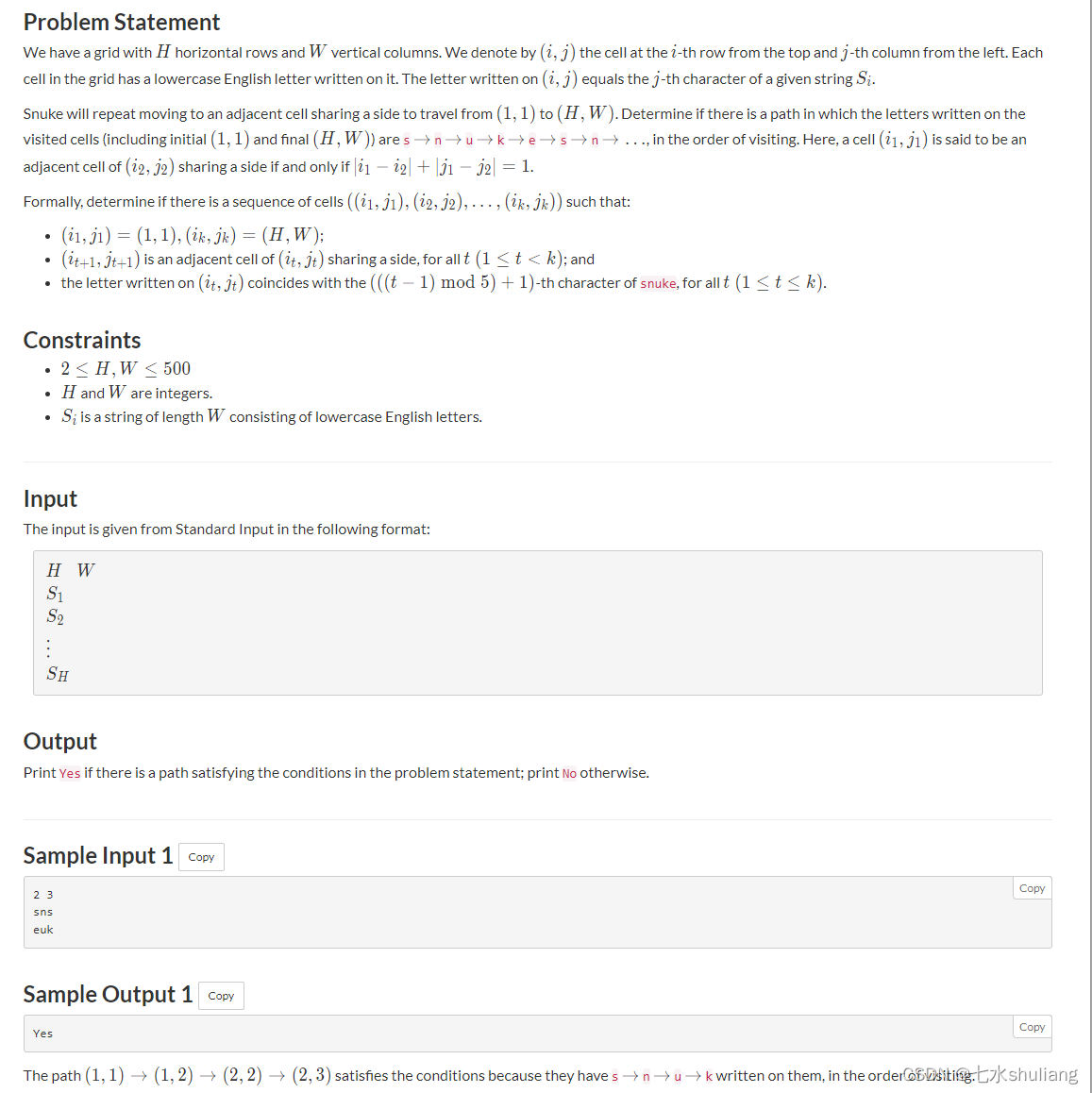
2. 思路分析
- 主要是在dp和bfs之间选择。
3. 代码实现
PROBLEM = """给出h行w列矩阵,每个位置是字母。
玩家从左上角走到右下角,沿路的字母组成的路径必须是'snuke'循环,问是否可以到达右下角。
"""
"""
显然转移的方向是按字母的,但是会循环。还是BFS比较方便,直接从左上角出发,向下一个字母转移即可。"""
# ms
def solve():
h, w = RI()
g = []
for _ in range(h):
s, = RS()
g.append(s)
t = 'snuke'
# if g[0][0] != 's' or g[-1][-1] != t[(h+w-1)%5]:
if g[0][0] != 's':
return print('No')
dd = {}
for i in range(1, len(t)):
dd[t[i - 1]] = t[i]
dd[t[-1]] = t[0]
vis = [[0] * w for _ in range(h)]
vis[0][0] = 1
q = deque([(0, 0)])
while q:
x, y = q.popleft()
c = g[x][y]
d = dd[c]
for dx, dy in DIRS:
a, b = x + dx, y + dy
if 0 <= a < h and 0 <= b < w and not vis[a][b] and g[a][b] == d:
if a == h-1 and b == w-1:
return print('Yes')
vis[a][b] = 1
q.append((a, b))
# print(vis)
print('No')
E - MEX
链接: E - MEX
1. 题目描述
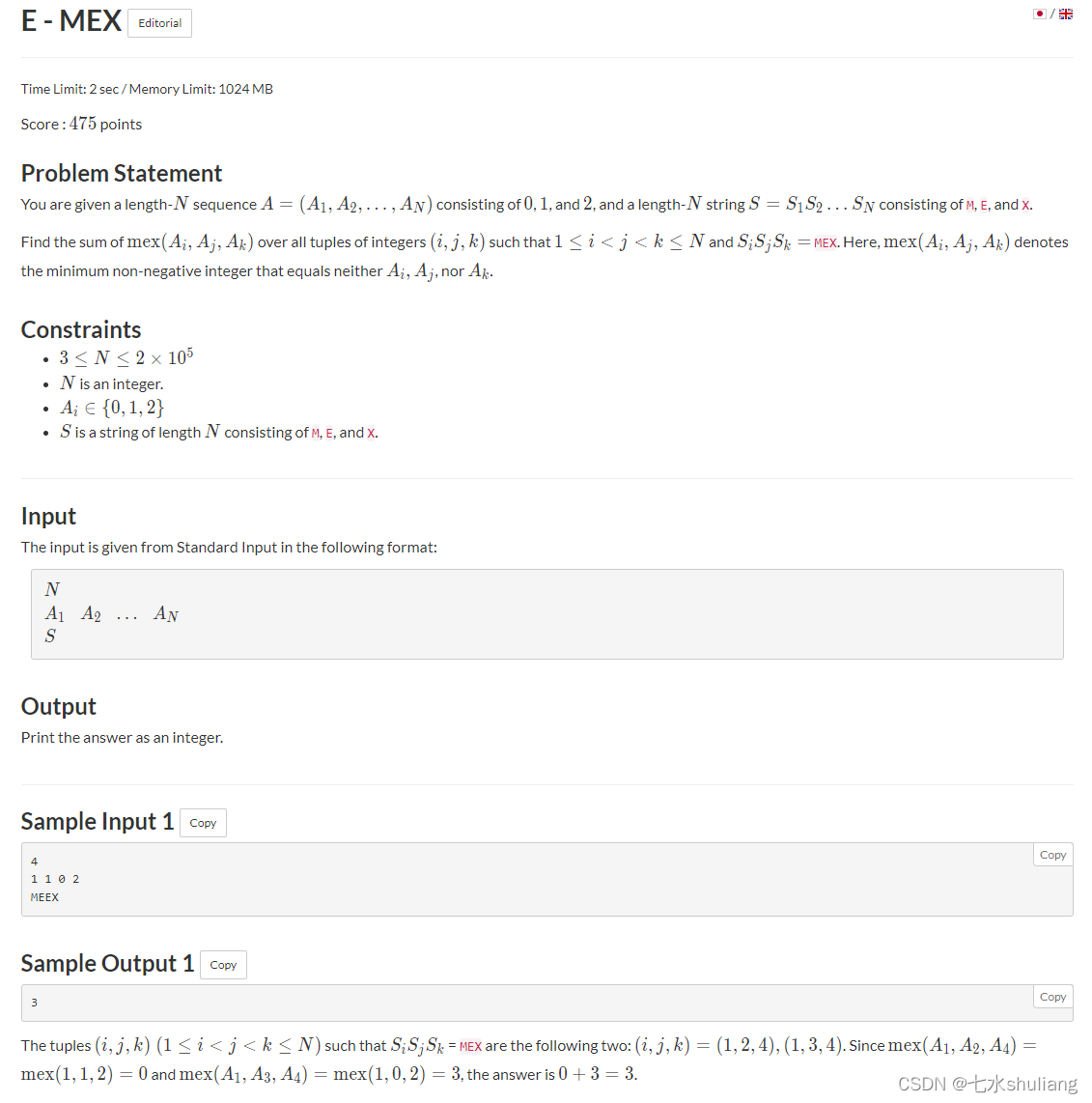
2. 思路分析
- 需要熟悉mex的定义和计算方式,知道复杂度,才敢继续。
3. 代码实现
PROBLEM = """给出长为n的数列a,仅包含012
给出长为n的字符串s,仅包含'm''e''x'。
找到所有s中的mex三元组下标,对应的a中的三个数组成的集合,求mex,最后sum。
"""
"""由于三元组只含012因此一定求mex可以暴力最多操作4次。
mex一定从me转移而来才有效,me一定从m转移而来才有效。
而这些字母对应数字是有限的,可以用哈希表计数即可。
"""
def mex(s):
for i in count(0):
if i not in s:
return i
# ms
def solve():
n, = RI()
a = RILST()
s, = RS()
ans = 0
m, me, x = Counter(), Counter(), Counter()
i = 0
for x, c in zip(a, s):
if c == 'M':
m[x] += 1
elif c == 'E':
for k, v in m.items():
me[(k, x)] += v
else:
for k, v in me.items():
s = set(k)
s.add(x)
ans += mex(s) * v
i += 1
print(ans)
F - Vouchers
链接: F - Vouchers
1. 题目描述
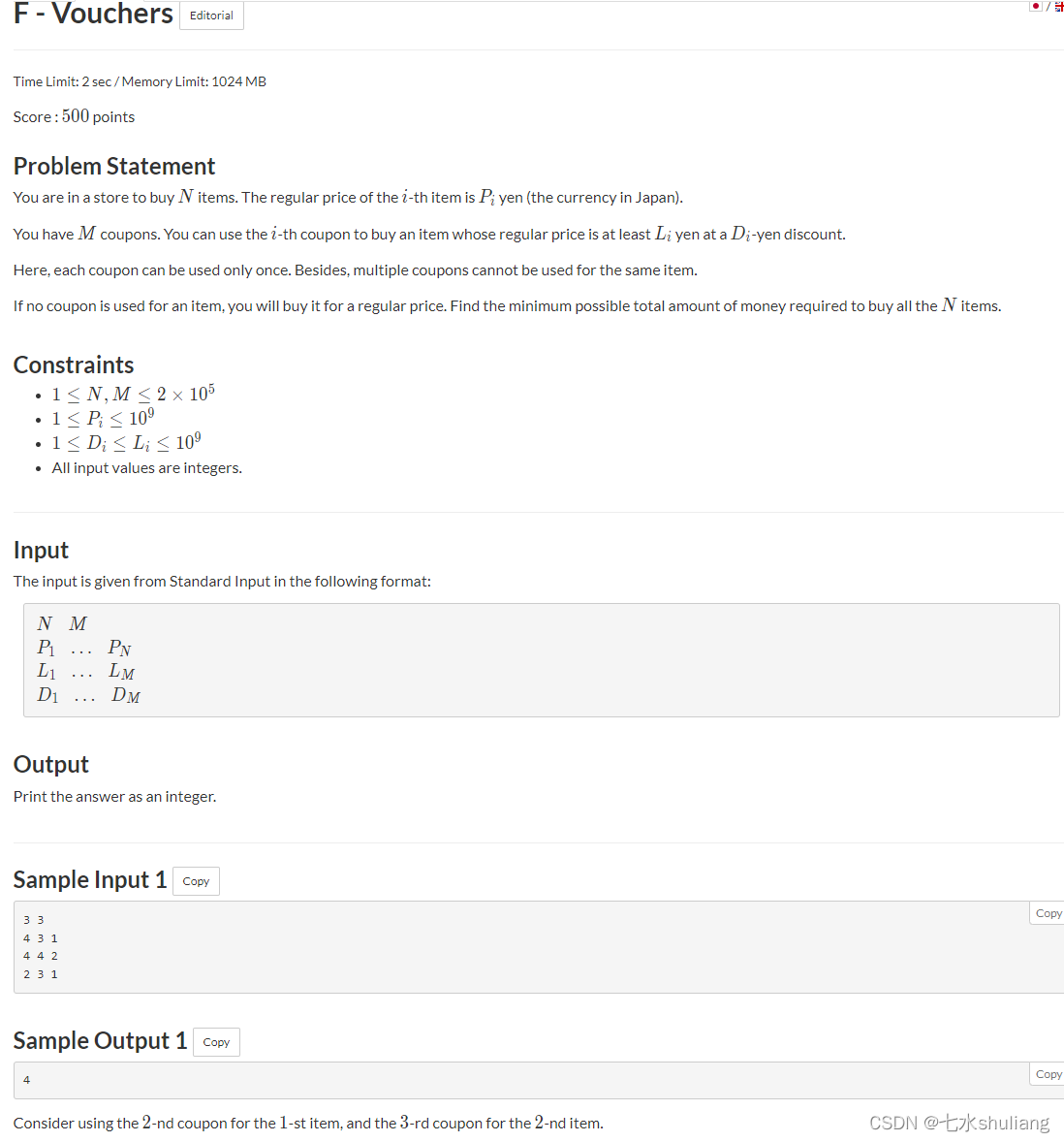
2. 思路分析
- 一眼贪心,但要考虑从大头优先匹配还是小头。
3. 代码实现
PROBLEM = """你要买n个物品,价格分别是pi.
你有m张满L减D的优惠券,每张券只能用一次。
问最少花多少钱可以买完这n个物品。
"""
"""贪心。
考虑双指针贪心,从大头开始还是小头。
发现大头不好贪。
从价格低物品开始买,考虑它能用哪张优惠券,选减得最多那个。这张券给更贵的不如给它用。
那么双指针+堆维护当前能用的券里最优那张即可。
"""
# 贪 ms
def solve():
n, m = RI()
p = RILST()
l = RILST()
d = RILST()
p.sort()
a = sorted(zip(l, d))
h = []
j = 0
ans = 0
for v in p:
while j < m and a[j][0] <= v:
heappush(h, -a[j][1])
j += 1
ans += v
if h:
ans += heappop(h)
print(ans)
G - Minimum Xor Pair Query
链接: G - Minimum Xor Pair Query
1. 题目描述
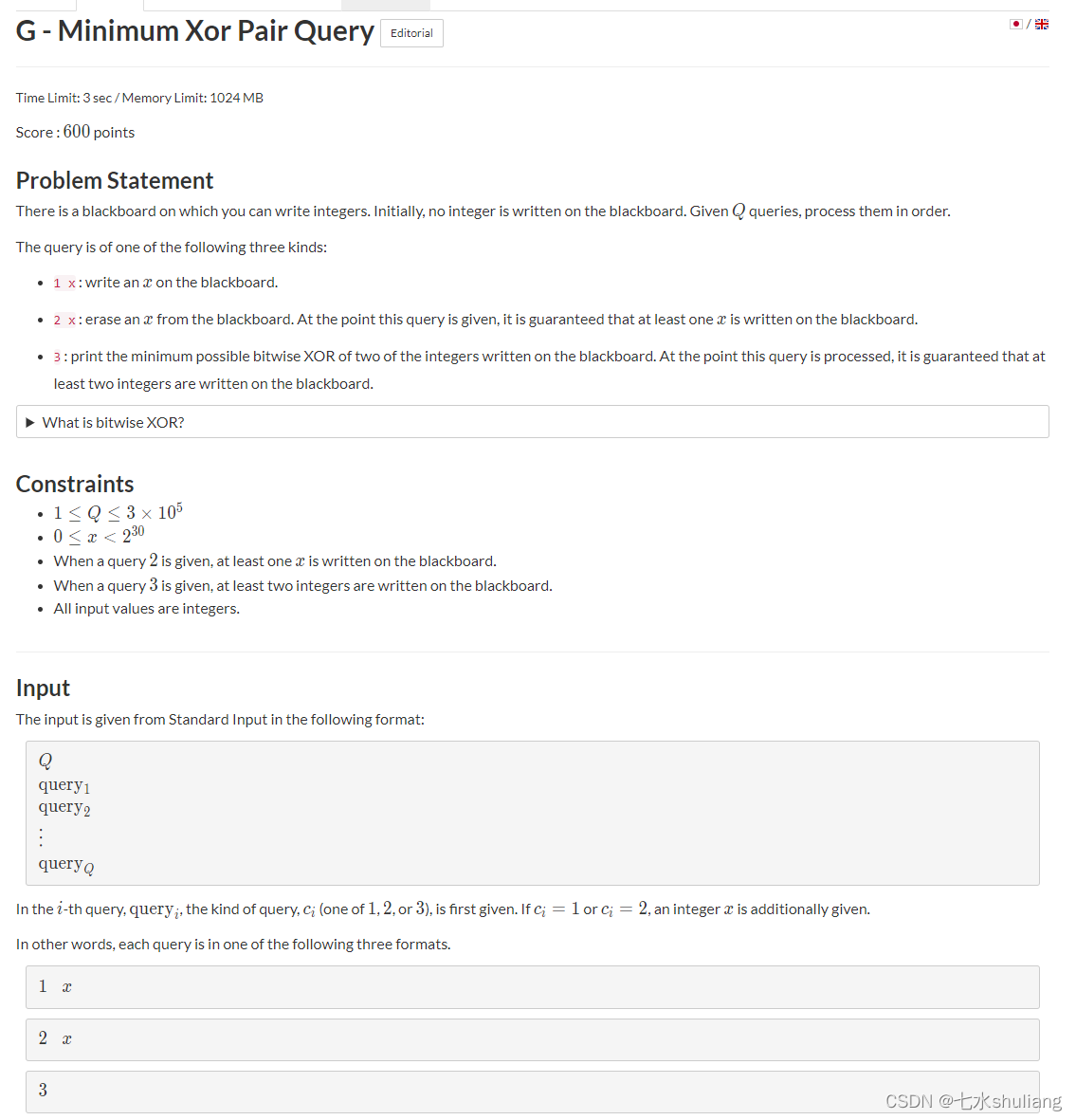
2. 思路分析
- 结论题。
- 我们常说异或运算同时具有加法和减法的一些性质。
- 这里是和减法性质一致:
- 一个集合里异或值最小的两个数,一定是相邻的。
- 因此排序后we
3. 代码实现
PROBLEM = """你有三个操作:
1.向集合里添加一个数x
2.从集合里删除一个数x
3.询问集合里两个数异或,最小是几。
"""
"""结论题:集合里最小两个数异或,一定是相邻两个数异或 """
class CuteSortedList:
def __init__(self, iterable=[], _load=200):
"""Initialize sorted list instance."""
values = sorted(iterable)
self._len = _len = len(values)
self._load = _load
self._lists = _lists = [values[i:i + _load] for i in range(0, _len, _load)]
self._list_lens = [len(_list) for _list in _lists]
self._mins = [_list[0] for _list in _lists]
self._fen_tree = []
self._rebuild = True
def _fen_build(self):
"""Build a fenwick tree instance."""
self._fen_tree[:] = self._list_lens
_fen_tree = self._fen_tree
for i in range(len(_fen_tree)):
if i | i + 1 < len(_fen_tree):
_fen_tree[i | i + 1] += _fen_tree[i]
self._rebuild = False
def _fen_update(self, index, value):
"""Update `fen_tree[index] += value`."""
if not self._rebuild:
_fen_tree = self._fen_tree
while index < len(_fen_tree):
_fen_tree[index] += value
index |= index + 1
def _fen_query(self, end):
"""Return `sum(_fen_tree[:end])`."""
if self._rebuild:
self._fen_build()
_fen_tree = self._fen_tree
x = 0
while end:
x += _fen_tree[end - 1]
end &= end - 1
return x
def _fen_findkth(self, k):
"""Return a pair of (the largest `idx` such that `sum(_fen_tree[:idx]) <= k`, `k - sum(_fen_tree[:idx])`)."""
_list_lens = self._list_lens
if k < _list_lens[0]:
return 0, k
if k >= self._len - _list_lens[-1]:
return len(_list_lens) - 1, k + _list_lens[-1] - self._len
if self._rebuild:
self._fen_build()
_fen_tree = self._fen_tree
idx = -1
for d in reversed(range(len(_fen_tree).bit_length())):
right_idx = idx + (1 << d)
if right_idx < len(_fen_tree) and k >= _fen_tree[right_idx]:
idx = right_idx
k -= _fen_tree[idx]
return idx + 1, k
def _delete(self, pos, idx):
"""Delete value at the given `(pos, idx)`."""
_lists = self._lists
_mins = self._mins
_list_lens = self._list_lens
self._len -= 1
self._fen_update(pos, -1)
del _lists[pos][idx]
_list_lens[pos] -= 1
if _list_lens[pos]:
_mins[pos] = _lists[pos][0]
else:
del _lists[pos]
del _list_lens[pos]
del _mins[pos]
self._rebuild = True
def _loc_left(self, value):
"""Return an index pair that corresponds to the first position of `value` in the sorted list."""
if not self._len:
return 0, 0
_lists = self._lists
_mins = self._mins
lo, pos = -1, len(_lists) - 1
while lo + 1 < pos:
mi = (lo + pos) >> 1
if value <= _mins[mi]:
pos = mi
else:
lo = mi
if pos and value <= _lists[pos - 1][-1]:
pos -= 1
_list = _lists[pos]
lo, idx = -1, len(_list)
while lo + 1 < idx:
mi = (lo + idx) >> 1
if value <= _list[mi]:
idx = mi
else:
lo = mi
return pos, idx
def _loc_right(self, value):
"""Return an index pair that corresponds to the last position of `value` in the sorted list."""
if not self._len:
return 0, 0
_lists = self._lists
_mins = self._mins
pos, hi = 0, len(_lists)
while pos + 1 < hi:
mi = (pos + hi) >> 1
if value < _mins[mi]:
hi = mi
else:
pos = mi
_list = _lists[pos]
lo, idx = -1, len(_list)
while lo + 1 < idx:
mi = (lo + idx) >> 1
if value < _list[mi]:
idx = mi
else:
lo = mi
return pos, idx
def add(self, value):
"""Add `value` to sorted list."""
_load = self._load
_lists = self._lists
_mins = self._mins
_list_lens = self._list_lens
self._len += 1
if _lists:
pos, idx = self._loc_right(value)
self._fen_update(pos, 1)
_list = _lists[pos]
_list.insert(idx, value)
_list_lens[pos] += 1
_mins[pos] = _list[0]
if _load + _load < len(_list):
_lists.insert(pos + 1, _list[_load:])
_list_lens.insert(pos + 1, len(_list) - _load)
_mins.insert(pos + 1, _list[_load])
_list_lens[pos] = _load
del _list[_load:]
self._rebuild = True
else:
_lists.append([value])
_mins.append(value)
_list_lens.append(1)
self._rebuild = True
def discard(self, value):
"""Remove `value` from sorted list if it is a member."""
_lists = self._lists
if _lists:
pos, idx = self._loc_right(value)
if idx and _lists[pos][idx - 1] == value:
self._delete(pos, idx - 1)
def remove(self, value):
"""Remove `value` from sorted list; `value` must be a member."""
_len = self._len
self.discard(value)
if _len == self._len:
raise ValueError('{0!r} not in list'.format(value))
def pop(self, index=-1):
"""Remove and return value at `index` in sorted list."""
pos, idx = self._fen_findkth(self._len + index if index < 0 else index)
value = self._lists[pos][idx]
self._delete(pos, idx)
return value
def bisect_left(self, value):
"""Return the first index to insert `value` in the sorted list."""
pos, idx = self._loc_left(value)
return self._fen_query(pos) + idx
def bisect_right(self, value):
"""Return the last index to insert `value` in the sorted list."""
pos, idx = self._loc_right(value)
return self._fen_query(pos) + idx
def count(self, value):
"""Return number of occurrences of `value` in the sorted list."""
return self.bisect_right(value) - self.bisect_left(value)
def __len__(self):
"""Return the size of the sorted list."""
return self._len
# def __getitem__(self, index):
# """Lookup value at `index` in sorted list."""
# pos, idx = self._fen_findkth(self._len + index if index < 0 else index)
# return self._lists[pos][idx]
def __getitem__(self, index):
"""Lookup value at `index` in sorted list."""
if isinstance(index, slice):
_lists = self._lists
start, stop, step = index.indices(self._len)
if step == 1 and start < stop: # 如果是正向的步进1,找到起起止点,然后把中间的拼接起来即可
if start == 0 and stop == self._len: # 全部
return reduce(iadd, self._lists, [])
start_pos, start_idx = self._fen_findkth(start)
start_list = _lists[start_pos]
stop_idx = start_idx + stop - start
# Small slice optimization: start index and stop index are
# within the start list.
if len(start_list) >= stop_idx:
return start_list[start_idx:stop_idx]
if stop == self._len:
stop_pos = len(_lists) - 1
stop_idx = len(_lists[stop_pos])
else:
stop_pos, stop_idx = self._fen_findkth(stop)
prefix = _lists[start_pos][start_idx:]
middle = _lists[(start_pos + 1):stop_pos]
result = reduce(iadd, middle, prefix)
result += _lists[stop_pos][:stop_idx]
return result
if step == -1 and start > stop: # 如果是负向的步进1,直接翻转调用自己再翻转即可
result = self.__getitem__(slice(stop + 1, start + 1))
result.reverse()
return result
indices = range(start, stop, step) # 若不是步进1,只好一个一个取
return list(self.__getitem__(index) for index in indices)
else:
pos, idx = self._fen_findkth(self._len + index if index < 0 else index)
return self._lists[pos][idx]
def __delitem__(self, index):
"""Remove value at `index` from sorted list."""
pos, idx = self._fen_findkth(self._len + index if index < 0 else index)
self._delete(pos, idx)
def __contains__(self, value):
"""Return true if `value` is an element of the sorted list."""
_lists = self._lists
if _lists:
pos, idx = self._loc_left(value)
return idx < len(_lists[pos]) and _lists[pos][idx] == value
return False
def __iter__(self):
"""Return an iterator over the sorted list."""
return (value for _list in self._lists for value in _list)
def __reversed__(self):
"""Return a reverse iterator over the sorted list."""
return (value for _list in reversed(self._lists) for value in reversed(_list))
def __repr__(self):
"""Return string representation of sorted list."""
return 'SortedList({0})'.format(list(self))
# ms
def solve():
n , = RI()
ans = CuteSortedList()
a = CuteSortedList()
for _ in range(n):
s = RILST()
if s[0] == 1:
x = s[1]
t = a.bisect_left(x)
if t and t < len(a):
ans.remove(a[t] ^ a[t - 1])
if t:
ans.add(a[t - 1] ^ x)
if t < len(a):
ans.add(a[t] ^ x)
a.add(x)
elif s[0] == 2:
x = s[1]
t = a.bisect_left(x)
if t:
ans.remove(a[t - 1] ^ x)
if t < len(a) - 1:
ans.remove(a[t + 1] ^ x)
if t and t < len(a) - 1:
ans.add(a[t + 1] ^ a[t - 1])
a.remove(x)
else:
print(ans[0])
六、参考链接
- 无






















 807
807











 被折叠的 条评论
为什么被折叠?
被折叠的 条评论
为什么被折叠?








